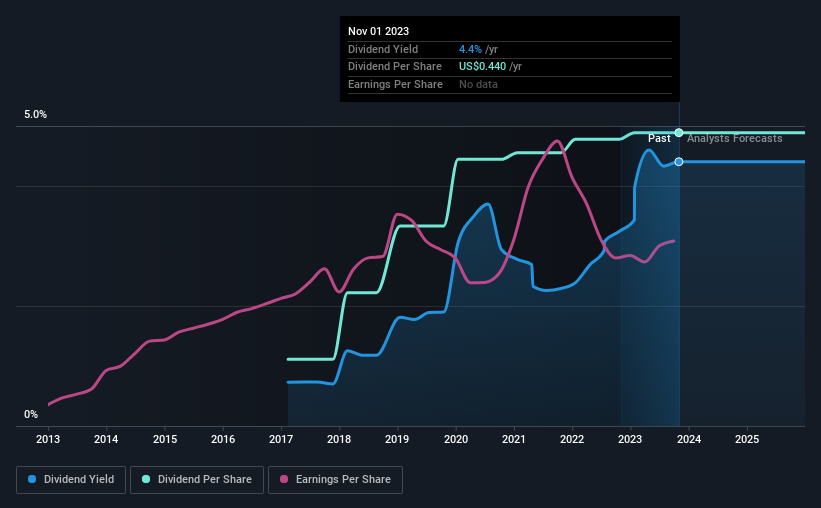Be Sure To Check Out Colony Bankcorp, Inc. (NASDAQ:CBAN) Before It Goes Ex-Dividend
Colony Bankcorp, Inc. (NASDAQ:CBAN) stock is about to trade ex-dividend in 4 days. Typically, the ex-dividend date is one business day before the record date which is the date on which a company determines the shareholders eligible to receive a dividend. The ex-dividend date is of consequence because whenever a stock is bought or sold, the trade takes at least two business day to settle. Meaning, you will need to purchase Colony Bankcorp's shares before the 7th of November to receive the dividend, which will be paid on the 22nd of November.
The company's next dividend payment will be US$0.11 per share, and in the last 12 months, the company paid a total of US$0.44 per share. Based on the last year's worth of payments, Colony Bankcorp stock has a trailing yield of around 4.4% on the current share price of $9.99. We love seeing companies pay a dividend, but it's also important to be sure that laying the golden eggs isn't going to kill our golden goose! As a result, readers should always check whether Colony Bankcorp has been able to grow its dividends, or if the dividend might be cut.
View our latest analysis for Colony Bankcorp
Dividends are typically paid out of company income, so if a company pays out more than it earned, its dividend is usually at a higher risk of being cut. Colony Bankcorp paid out a comfortable 35% of its profit last year.
When a company paid out less in dividends than it earned in profit, this generally suggests its dividend is affordable. The lower the % of its profit that it pays out, the greater the margin of safety for the dividend if the business enters a downturn.
Click here to see the company's payout ratio, plus analyst estimates of its future dividends.
Have Earnings And Dividends Been Growing?
Businesses with strong growth prospects usually make the best dividend payers, because it's easier to grow dividends when earnings per share are improving. If earnings decline and the company is forced to cut its dividend, investors could watch the value of their investment go up in smoke. This is why it's a relief to see Colony Bankcorp earnings per share are up 6.7% per annum over the last five years.
The main way most investors will assess a company's dividend prospects is by checking the historical rate of dividend growth. In the last seven years, Colony Bankcorp has lifted its dividend by approximately 24% a year on average. We're glad to see dividends rising alongside earnings over a number of years, which may be a sign the company intends to share the growth with shareholders.
Final Takeaway
Is Colony Bankcorp worth buying for its dividend? Colony Bankcorp has seen its earnings per share grow slowly in recent years, and the company reinvests more than half of its profits in the business, which generally bodes well for its future prospects. We think this is a pretty attractive combination, and would be interested in investigating Colony Bankcorp more closely.
So while Colony Bankcorp looks good from a dividend perspective, it's always worthwhile being up to date with the risks involved in this stock. In terms of investment risks, we've identified 1 warning sign with Colony Bankcorp and understanding them should be part of your investment process.
Generally, we wouldn't recommend just buying the first dividend stock you see. Here's a curated list of interesting stocks that are strong dividend payers.
Have feedback on this article? Concerned about the content? Get in touch with us directly. Alternatively, email editorial-team (at) simplywallst.com.
This article by Simply Wall St is general in nature. We provide commentary based on historical data and analyst forecasts only using an unbiased methodology and our articles are not intended to be financial advice. It does not constitute a recommendation to buy or sell any stock, and does not take account of your objectives, or your financial situation. We aim to bring you long-term focused analysis driven by fundamental data. Note that our analysis may not factor in the latest price-sensitive company announcements or qualitative material. Simply Wall St has no position in any stocks mentioned.

